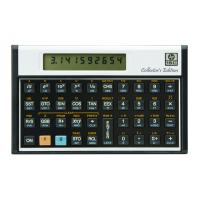154 Section 12: Calculating with Matrices
Keystrokes Display
-
C 2 3
Calculates B − A and stores
values in redimensioned
result matrix C.
The result is C =
0 1 2
3 4 8
Matrix Multiplication
With matrix description in both the X- and Y-registers, you can calculate
three different matrix products. The table below shows the results of the
three functions for a matrix X specified in the X-register and a matrix Y
specified in the Y-register. The matrix X
−1
is the inverse of X, and the
matrix Y
T
is the transpose of Y.
Pressing Calculates
*
* YX
´ > 5 Y
T
X
÷ X
−1
Y
*
Result is stored in result matrix. For ÷
matrix can be Y but not X
. For the others, the result
matrix must be other than X or Y.
Note: When you use the ÷ function to evaluate the expression
A
−1
B, you must enter the matrix descriptors in the order B, A
rather than in the order that they appear in the expression.
*
The value stored in each element of the result matrix is determined
according to the usual rules of matrix multiplication.
For > 5, the matrix specified in the Y-register isn’t changed by this
operation, even though its transpose is used. The result is identical to that
obtained using > 4 (transpose) and *.
*
This is the same order you would use if you were entering b and a for evaluating
a
−1
b = b/ a.

